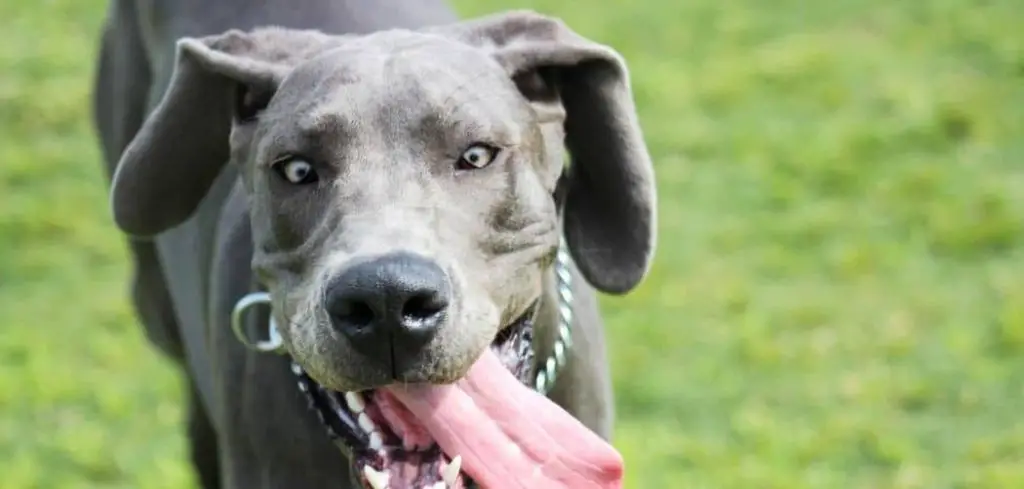It’s alarming to see your dog drooling excessively and stumbling or off balance. These symptoms can appear suddenly and may point to serious underlying health issues.
We outline the common reasons for a dog drooling and being off balance, what you can do at home, and when to seek veterinary help.
Dog Drooling and Off Balance — Why It Happens
Dogs who are drooling and off balance may be dealing with neurological conditions, toxin ingestion, inner ear disorders, or severe systemic illnesses.
These symptoms are often linked because many health issues that affect balance also impact the nervous system or cause nausea—both of which can lead to drooling.
Vestibular disease, poisoning, and even heatstroke can result in both signs. These conditions vary in severity, but some require immediate veterinary attention.

Dog Drooling and Off Balance: Common Causes
Vestibular Disease
Vestibular disease affects your dog’s inner ear and balance system. It’s common in older dogs and can come on suddenly.
Dogs may drool because the dizziness and nausea caused by the condition are deeply unsettling. You might also notice head tilting, rapid eye movements (nystagmus), circling, or falling to one side.
Though vestibular disease can look like a stroke, it’s often less severe and may resolve on its own. Still, it’s important to have your vet rule out more serious neurological issues.
Read more: Dog Drooling and Confused (Is your pup acting strange?)
Toxin Ingestion
Many household and outdoor substances are toxic to dogs and can cause both drooling and unsteadiness.
Ingesting pesticides, antifreeze, certain plants (like mushrooms), or medications not meant for dogs can lead to neurological symptoms and excessive salivation. A dog may also have tremors, vomiting, diarrhea, or seizures.
Toxins act quickly, so if you suspect your dog has eaten something harmful, prompt veterinary care is essential. Waiting too long can lead to irreversible organ or nerve damage.
Ear Infections
An inner or middle ear infection can disrupt your dog’s sense of balance. These infections often cause head shaking, tilting, and a wobbly gait.
The discomfort may also lead to drooling, especially if the infection affects the nerves near the jaw. Your dog might cry out when touching the ear, scratch excessively, or have foul-smelling discharge.
Though treatable, untreated ear infections can worsen and spread, making early vet intervention important.
Heatstroke
Overheating is a life-threatening emergency that can cause disorientation and heavy drooling.
Dogs suffering from heatstroke may pant excessively, collapse, vomit, or appear confused. Their gums might look dark red, and they may stumble or be unable to walk straight.
This is a medical emergency. Never wait to see if your dog improves—immediate cooling measures and vet care are critical to prevent organ failure.
Neurological Disorders
Conditions like brain tumors, encephalitis (brain inflammation), or seizures can affect both balance and salivation.
You might notice other signs such as changes in behavior, staring spells, circling, or collapsing. Some dogs may have trouble standing or seem dazed after a seizure.
Neurological disorders can be subtle at first but often progress. Early diagnosis helps manage the condition and improves your dog’s quality of life.
Oral or Dental Pain
Pain in the mouth, jaw, or throat can cause excessive drooling and, in rare cases, reluctance to walk normally.
Tumors, dental abscesses, or foreign objects lodged in the mouth may lead to these symptoms. If the discomfort is severe, your dog may appear off balance simply from trying to avoid moving their head or neck.
Look for bad breath, bleeding, or pawing at the face. Oral exams by your vet can quickly identify these issues.
What to Do If Your Dog Is Drooling and Seems Off Balance
If your dog suddenly starts drooling and seems unsteady, bring them into a calm, quiet environment.
Keep them from stairs, sharp furniture, or other hazards to prevent injury while their coordination is impaired. Avoid offering food or water until you know the cause, especially if they seem nauseated or neurologically impaired.
Monitor their symptoms closely. If they appear stable and alert, contact your vet for guidance. If your dog improves within a few hours—particularly with vestibular disease—it may not be urgent, but they should still be checked soon.
Avoid guessing the cause or giving medications at home. Many signs overlap between serious and less dangerous conditions.
If your dog may have been exposed to toxins, don’t wait—call your vet or an emergency clinic immediately.
When to Call or Visit Your Vet
Call your vet right away if your dog:
Can’t stand or repeatedly falls
Has uncontrolled drooling with tremors or vomiting
Is non-responsive or acting confused
Has rapid eye movements or seizure-like behavior
Shows signs of heatstroke (panting, collapse, dark red gums)
These are all indicators of potentially life-threatening conditions. Even if your dog improves, a vet visit is crucial to rule out hidden issues.
Early intervention often makes the difference between a quick recovery and a long, difficult one.
Read more: Dog Drooling and Chomping (What this odd behavior might mean)
Key Takeaway
Drooling and being off balance are serious signs that something is wrong with your dog.
Whether it’s vestibular disease, a toxin, or an inner ear infection, the symptoms should never be ignored.
Create a safe space, avoid giving anything by mouth, and contact your vet as soon as possible.
Your dog depends on you to act quickly—and that fast response can make all the difference.
